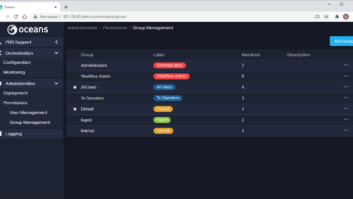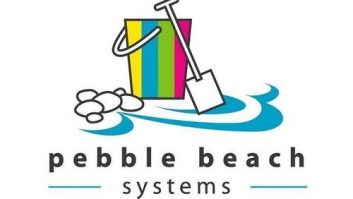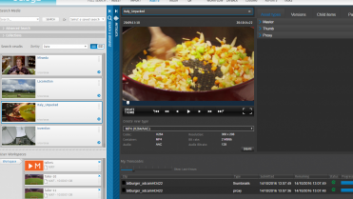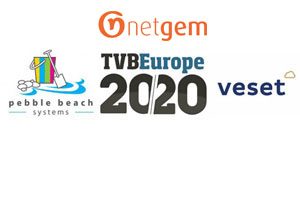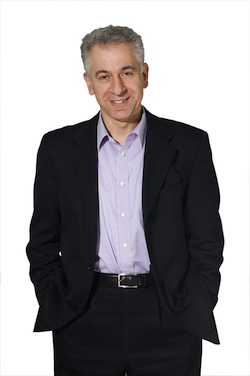
With the company’s tenth anniversary this month, and its best ever quarter at the end of 2009, it seems like a good time to review the performance of automation and asset management specialist Pebble Beach Systems. Dick Hobbs takes a look at the company.
The Pebble Beach Systems founders used to claim, with some justification, that few had a longer heritage in playout automation. Peter Hajittofi and Ian Cockett worked together at Logica at the software house’s ill-fated attempts to pioneer broadcast automation, then acted as the European arm of Louth, first with Logica acting as distributor then setting up a new business.
When Louth became part of Harris, Cockett and Hajittofi were full of ideas for a new architecture and, with another old Logica hand Julian Hepworth they set up their own business.
“It is a real advantage that the directors all have the same background,” CEO Peter Hajittofi told me. “There is a strong Logica legacy in terms of how to plan, structure and cost a project, and in pride in the job. For Pebble Beach it means that the management team are of like mind.”
Playout automation is mission critical for broadcasters. So how do you persuade a company to entrust it to a start-up? Hajittofi is honest: “For the first year or so we leaned heavily on friends in the industry who knew us and trusted us. We showed them our new architectures, and demonstrated that we could offer customisation that other suppliers would not do.
“Then we had to start winning business from other people,” he continues. “We had a couple of great IBCs. Our first multi-channel installation was MTG in Sweden – we promoted it and were fortunate to get some more.”
Fortune was a small part of it, and Hajittofi is being characteristically modest. The work came because Pebble Beach demonstrated that they could do what they promised. “Just because the market is there does not make it easy,” he said. “You have to deliver, to do what you say.”
That pride also comes out in Hajittofi’s assertion that their ambition is to be the leader in automation and media management worldwide. “We probably already are in the Middle East and some parts of northern Europe,” he claims. As well as a base in the Middle East, the company has recently opened offices in Hong Kong and the USA.
“We make some sales direct,” he explains, “but much of our business comes from dealers and systems integrators around the world. They have been very important for our success. You can only keep a systems integrator on side if you are not costing them money. So you have to put in the support.”
New MAM structure
As well as looking after customers and partners, Pebble Beach has also had to face the practicalities of being a start-up company, which can seem a lot less glamorous. “Cash flow and finance needs to be well managed,” says Hajittofi. “Our decision was to grow organically.
“We have never borrowed money,” he adds. “There is no doubt that with venture funding we could have grown more quickly, but I think that one of the reasons for our success is the relatively slow start. It meant we were able to develop things behind the scenes without too many customer pressures. There is a real danger in going too fast.”
When the three started the business in 2000 playout automation was an established concept but still being rolled out. Today, surely, everyone who needs it has got it, so where does the continuing business come from, and how can a company retain a distinctive offering?
“Yes, playout is almost a commodity today,” Hajittofi admits, adding “but it is the workflow that is new ground.
“Automation is a very wide remit,” he explains. “We are not just getting things to air any more. Now we have to manage assets, get them in the right form and in the right place. It is not just ingesting and playing out.
“We are now being involved much earlier in the cycle,” he says. “In the old days, the traffic system looked after assets and just handed us a playlist. Now we are being notified of the content sometimes months in advance. Making trailers, compliance editing – this is all seen as part of the asset management structure, and we now include tools for this.
“Broadcasters have still got a long way to go to automate all of these things. This business is going to be around for a long time. File-based workflows will become more common, so automation will move upstream. There will always be linear playout, but there will be more emphasis on content on demand.
“But that still needs the basics of production and media management,” he continues. “Content in the right form still has to be delivered to the server, and later archived. We will still have a role in the management of the media. In fact, we are going to have to manage larger volumes of data.”
Recently there has been a great deal of pressure towards “channel in a box” solutions, at all levels of the industry. Is this a goal for Pebble Beach?
“We see the value in best of breed, so we are not going to station in a box systems,” Peter Hajittofi states. “For most broadcasters a high level of service and functionality like fault tolerance is important.
“But we do need to support all equipment for lower cost channels and emergency backup facilities,” he adds. “So we have already delivered systems using the Miranda Xchannel server with graphics, for example.”
The strategy for the next ten years, and towards the ambition of market leadership, sees the completion of investment in the next generation platform which, in keeping with the company’s seaside theme, is called Marina.
“This is a totally distributed architecture, so we can scale much better than the old platform,” says Hajittofi. “It will run on Linux – not being dependent just on Microsoft will be significant.”
The new platform is designed to support the extended role for asset management that the company sees as its future market. It is also designed to meet the needs of its global market by supporting any language through a configurable user interface.
“We have made the language choice hot-swappable,” he claims. “How can we support a system any other way: an engineer can see what is going on with the touch of a key, even if the native system is running in Arabic or an Asian language.”
That seems to underline a core part of the Pebble Beach philosophy – and perhaps the secret of being a success in such a critical market – which is that support is absolutely central to keeping the user happy.
“This is not like conventional IT,” Peter Hajittofi claims. “You have to offer constant support, remotely and on site. We are proud that we have never lost a customer.”
